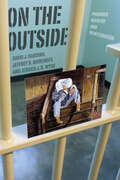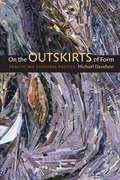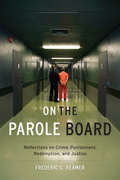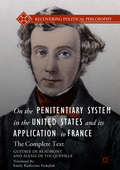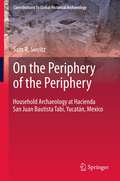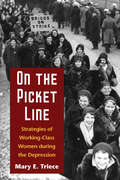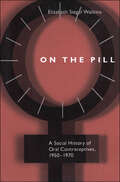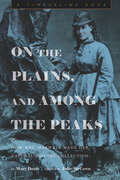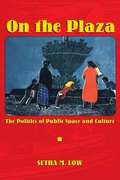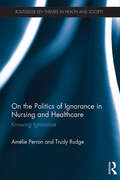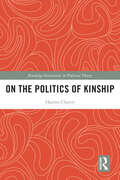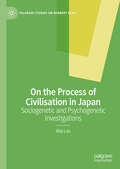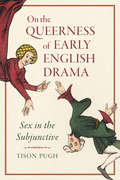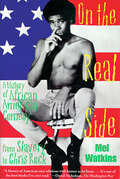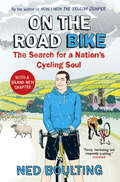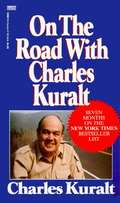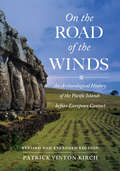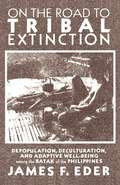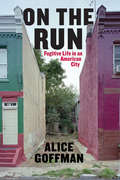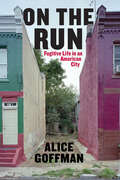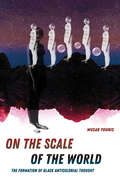- Table View
- List View
On the Outside: Prisoner Reentry and Reintegration
by David J. Harding Jeffrey D. Morenoff Jessica J. Wyse“A crucial analysis of how the truly disadvantaged people who enter prison fare in the three years after their release.” —Paula England, NYUAmerica’s high incarceration rates are a well-known facet of contemporary political conversations. Mentioned far less often is what happens to the nearly 700,000 former prisoners who rejoin society each year. On the Outside examines the lives of twenty-two people—varied in race and gender but united by their time in the criminal justice system—as they pass out of the prison gates and back into the world. The book takes a clear-eyed look at the challenges faced by formerly incarcerated citizens as they try to find work, housing, and stable communities. Standing alongside these individual portraits is a quantitative study conducted by the authors that followed every state prisoner in Michigan who was released on parole in 2003 (roughly 11,000 individuals) for the next seven years, providing a comprehensive view of their post-prison neighborhoods, families, employment, and contact with the parole system. On the Outside delivers a powerful combination of hard data and personal narrative that shows why our country continues to struggle with the social and economic reintegration of the formerly incarcerated.One of the Vera Institute of Justice’s Best Criminal Justice Books of 2019
On the Outskirts of Form: Practicing Cultural Poetics
by Michael DavidsonThis new book by eminent scholar Michael Davidson gathers his essays concerning formally innovative poetry from modernists such as Mina Loy, George Oppen, and Wallace Stevens to current practitioners such as Cristina Rivera-Garza, Heriberto Yepez, Lisa Robertson, and Mark Nowak. The book considers poems that challenge traditional poetic forms and in doing so trouble normative boundaries of sexuality, subjectivity, gender, and citizenship. At the heart of each essay is a concern with the "politics of form," the ways that poetry has been enlisted in the constitution--and critique--of community. Davidson speculates on the importance of developing cultural poetics as an antidote to the personalist and expressivist treatment of postwar poetry. A comprehensive and versatile collection, On the Outskirts of Form places modern and contemporary poetics in a cultural context to reconsider the role of cultural studies and globalization in poetry.
On the Pampas
by Maria Cristina BruscaAn account of a little girl's idyllic summer at her grandparents' ranch on the pampas of Argentina. Ages 7 and up.
On the Parole Board: Reflections on Crime, Punishment, Redemption, and Justice
by Frederic G. ReamerFew people experience life inside of prison. Even fewer are charged with the formidable responsibility of deciding whether inmates should be released. In his twenty-four years on the Rhode Island Parole Board, Frederic G. Reamer has judged the fates of thousands of inmates, deciding which are ready to reenter society and which are not. It is a complicated choice that balances injury to victims and their families against an offender's capacity for transformation.With rich retellings of criminal cases-some banal, some brutal-On the Parole Board is a singular book that explains from an insider's perspective how a variety of factors play into the board's decisions: the ongoing effect on victims and their loved ones, the life histories of offenders, the circumstances of the crimes, and the powerful and often extraordinary displays of forgiveness and remorse. Pulling back the curtain on a process largely shrouded in mystery, Reamer lays bare the thorny philosophical issues of crime and justice and their staggering consequences for inmates, victims, and the public at large. Reamer and his colleagues often hope, despite encountering behavior at its worst, that criminals who have made horrible mistakes have the capacity for redemption. Yet that hope must be tempered with a realistic appraisal of risk, given the potentially grave consequences of releasing an inmate who may commit a future crime. This book will appeal to anyone interested in the complexities of the criminal justice system, the need to correct its injustices, and the challenges of those who must decide when justice has been served.
On the Parole Board: Reflections on Crime, Punishment, Redemption, and Justice
by Frederic G. ReamerFew people experience life inside of prison. Even fewer are charged with the formidable responsibility of deciding whether inmates should be released. In his twenty-four years on the Rhode Island Parole Board, Frederic G. Reamer has judged the fates of thousands of inmates, deciding which are ready to reenter society and which are not. It is a complicated choice that balances injury to victims and their families against an offender's capacity for transformation. With rich retellings of criminal cases—some banal, some brutal—On the Parole Board is a singular book that explains from an insider's perspective how a variety of factors play into the board's decisions: the ongoing effect on victims and their loved ones, the life histories of offenders, the circumstances of the crimes, and the powerful and often extraordinary displays of forgiveness and remorse. Pulling back the curtain on a process largely shrouded in mystery, Reamer lays bare the thorny philosophical issues of crime and justice and their staggering consequences for inmates, victims, and the public at large. Reamer and his colleagues often hope, despite encountering behavior at its worst, that criminals who have made horrible mistakes have the capacity for redemption. Yet that hope must be tempered with a realistic appraisal of risk, given the potentially grave consequences of releasing an inmate who may commit a future crime. This book will appeal to anyone interested in the complexities of the criminal justice system, the need to correct its injustices, and the challenges of those who must decide when justice has been served.
On the Penitentiary System in the United States and its Application to France: The Complete Text (Recovering Political Philosophy)
by Alexis De Tocqueville Emily Katherine Ferkaluk Gustave De BeaumontThis book provides the first complete, literal English translation of Alexis de Tocqueville’s and Gustave de Beaumont’s first edition of On the Penitentiary System in the United States and Its Application to France. The work contains a critical comparison of two competing American penitentiary disciplines known as the Auburn and Philadelphia systems, an evaluation of whether American penitentiaries can successfully work in France, a detailed description of Houses of Refuge as the first juvenile detention centers, and an argument against penal colonization. The work provides valuable insights into understanding Tocqueville as a statesman, as well as a comparative look at civic engagement in early American and French penal reform movements. The Translator’s Introduction provides historical context for understanding Tocqueville’s work in French penal reform and the major themes of the report. The book thus fills a void in Tocquevillian studies and extrapolates the roots of American and French criminal justice systems in the nineteenth century.
On the Periphery of the Periphery
by Samuel SweitzThis book examines from an archaeological perspective the social and economic changes that took place in Yucatán, Mexico beginning in the 18th century, as the region became increasingly articulated within global networks of exchange. Of particular interest is the formation and ultimate supremacy of the hacienda system in Yucatán and the effect that new forms of capitalist organized production had on native Maya social organization. Household archaeology and spatial analysis conducted on the grounds of the former Hacienda San Juan Bautista Tabi provides the data for analyzing the results of this change on the daily lives and existence of those individuals incorporated within the hacienda system. The use of archaeological excavation to place the lives of local individuals within the context of larger global processes makes this book a worthy contribution to the study of archaeology.
On the Picket Line: Strategies of Working-Class Women during the Depression
by Mary TrieceBonnie Ritter Book Award, National Communication Association's Feminist and Women Studies Division, 2008. On the Picket Line uncovers the voices of working-class women, particularly those active in the Communist Party, U.S.A., in order to examine how these individuals confronted the tensions between their roles as workers, wives, mothers, and consumers. Combining critical analysis, Marxist and feminist theory, and labor history, Mary E. Triece analyzes the protest tactics employed by working class women to challenge dominant ideologies surrounding domesticity. She details the rhetorical strategies used by women to argue for their rights as workers in the paid labor force and as caregivers in the home. Their overtly coercive tactics included numerous sit-ins, strikes, and boycotts that won tangible gains for working poor and unemployed women. The book also gives voice to influential figures in the 1930s labor movement (many of whom were members of the Communist Party, U.S.A.), such as Ella Reeve Bloor, Margaret Cowl, Anna Damon, Ann Burlak, and Grace Hutchins. Triece ultimately argues that these confrontational protest tactics of the 1930s remain relevant in today’s fights for more humane workplaces and better living conditions.
On the Pill: A Social History of Oral Contraceptives, 1950-1970
by Elizabeth Siegel Watkins"In 1968, a popular writer ranked the pill's importance with the discovery of fire and the developments of tool-making, hunting, agriculture, urbanism, scientific medicine, and nuclear energy. Twenty-five years later, the leading British weekly, the Economist, listed the pill as one of the seven wonders of the modern world. The image of the oral contraceptive as revolutionary persists in popular culture, yet the nature of the changes it supposedly brought about has not been fully investigated. After more than thirty-five years on the market, the role of the pill is due for a thorough examination."—from the IntroductionIn this fresh look at the pill's cultural and medical history, Elizabeth Siegel Watkins re-examines the scientific and ideological forces that led to its development, the part women played in debates over its application, and the role of the media, medical profession, and pharmaceutical industry in deciding issues of its safety and meaning. Her study helps us not only to understand the contraceptive revolution as such but also to appreciate the misinterpretations that surround it.
On the Plains, and Among the Peaks: or, How Mrs. Maxwell Made Her Natural History Collection: by Mary Dartt (Timberline Books)
by Mary DarttAmerican naturalist and taxidermist Martha Maxwell became famous in the 1870s for her skill and expertise in collecting and preserving specimens of Colorado’s wildlife but is virtually unknown today. On the Plains, and Among the Peaks, written in 1879 by Maxwell’s half-sister Mary Dartt, provides a fascinating case study of how women practiced natural history and taxidermy, as well as a fresh look at the early exploration and settlement of Colorado. Dartt’s book tells the story of Maxwell’s lifelong passion and dedication to work and education that made her a pioneer in more ways than one. It catalogs her important scientific contributions and development of museum habitat groupings and lifelike taxidermy mounts, showcases engaging accounts of wilderness excursions on the frontier of the Western United States in the 1860s and 1870s, and testifies to her resolve to show that women were capable of succeeding in traditionally male-dominated fields. This scholarly edition of On the Plains, and Among the Peaks will spark renewed interest in Maxwell and Dartt as neglected figures in nineteenth-century US history and literature, opening a conversation that other literary scholars and historians will join to further situate their work within the numerous disciplines to which it speaks, including nineteenth-century American literature; women’s, western, environmental, and natural history; and gender, museum, and animal studies.
On the Plaza
by Setha M. LowIn this wide-ranging, multi-disciplinary study, Setha M. Low explores the interplay of space and culture in the plaza, showing how culture acts to shape public spaces and how the physical form of the plaza encodes the social, political, and economic relations within the city. Low centers her study on two plazas in San José, Costa Rica, with comparisons to public spaces in the United States, Europe, Asia, and Latin America. She interweaves ethnography, history, literature, and personal narrative to capture the ambiance and meaning of the plaza. She also uncovers the contradictory ethnohistories of the European and indigenous origins of the Latin American plaza and explains why the plaza is often a politically contested space.
On the Politics of Ignorance in Nursing and Health Care: Knowing Ignorance (Routledge Key Themes in Health and Society)
by Amelie Perron Trudy RudgeIgnorance is mostly framed as a void, a gap to be filled with appropriate knowledge. In nursing and health care, concerns about ignorance fuel searches for knowledge expected to bring certainty to care provision, preventing risk, accidents, or mistakes. This unique volume turns the focus on ignorance as something productive in itself and works to understand how ignorance and its operations shape what we do and do not know. Focusing explicitly on nursing practice and its organization within contemporary health settings, Perron and Rudge draw on contemporary interdisciplinary debates to discuss social processes informed by ignorance, ignorance’s temporal and spatial boundaries, and how ignorance defines what can be known by specific groups with differential access to power and social status. Using feminist, postcolonial and historical analyses, this book challenges dominant conceptualizations and discusses a range of "nonknowledges" in nursing and health work, including uncertainty, abjection, denial, deceit and taboo. It also explores the way dominant research and managerial practices perpetuate ignorance in healthcare organisations. In health contexts, productive forms of ignorance can help to future-proof understandings about the management of healthy/sick bodies and those caring for them. Linking these considerations to nurses’ approaches to challenges in practice, this book helps to unpack the power situated in the use of ignorance and pays special attention to what is safe or unsafe to know, from both individual and organisational perspectives. On the Politics of Ignorance in Nursing and Health Care is an innovative read for all students and researchers in nursing and the health sciences interested in understanding more about transactions between epistemologies, knowledge building practices and research in the health domain. It will also be of interest to scholars involved in the interdisciplinary study of ignorance.
On the Politics of Kinship (Routledge Innovations in Political Theory)
by Hannes CharenIn this book, Hannes Charen presents an alternative examination of kinship structures in political theory. Employing a radically transdisciplinary approach, On the Politics of Kinship is structured in a series of six theoretical vignettes, or frames. Each chapter frames a figure, aspect, or relational context of the family or kinship. Some chapters are focused on a critique of the family as a state sanctioned institution while others cautiously attempt to recast kinship in a way to reimagine mutual obligation through the generation of kinship practices understood as a perpetually evolving set of relational responses to finitude. In doing so, Charen considers the ways in which kinship is a plastic social response to embodied exposure, both concealed and made more evident in the bloated, feeble and broken individualities and nationalities that seem to dominate our social and political landscape today. On the Politics of Kinship will be of interest to political theorists, as to feminists, anthropologists and social scientists in general.
On the Process of Civilisation in Japan: Sociogenetic and Psychogenetic Investigations (Palgrave Studies on Norbert Elias)
by Wai LauThis book charts the process of civilisation in Japan. Using the theory of civilising processes developed by Norbert Elias, the author examines the complex underlying structural and psychological processes from the seventh century to the twentieth century. Furthermore, by drawing on rich historical data, the author illustrates how these complex processes led the Japanese to see themselves as ‘more civilised’ than their forebears and neighbouring countries. Although the theory serves as an important reference point, the author draws on other works to address different complex questions surrounding Japanese development. Therefore, this book presents three key themes: first, it gives an alternative understanding of the complex developments of Japanese society; second, it intercedes into an ongoing debate about the applicability of Elias’s theory in a non-Western context; and third, it expands Elias’s theory.
On the Queerness of Early English Drama: Sex in the Subjunctive
by Tison PughOften viewed as theologically conservative, many theatrical works of late medieval and early Tudor England nevertheless exploited the performative nature of drama to flirt with unsanctioned expressions of desire, allowing queer identities and themes to emerge. Early plays faced vexing challenges in depicting sexuality, but modes of queerness, including queer scopophilia, queer dialogue, queer characters, and queer performances, fractured prevailing restraints. Many of these plays were produced within male homosocial environments, and thus homosociality served as a narrative precondition of their storylines. Building from these foundations, On the Queerness of Early English Drama investigates occluded depictions of sexuality in late medieval and early Tudor dramas. Tison Pugh explores a range of topics, including the unstable genders of the York Corpus Christi Plays, the morally instructive humour of excremental allegory in Mankind, the confused relationship of sodomy and chastity in John Bale’s historical interludes, and the camp artifice and queer carnival of Sir David Lyndsay’s Ane Satyre of the Thrie Estaitis. Pugh concludes with Terrence McNally’s Corpus Christi, pondering the afterlife of medieval drama and its continued utility in probing cultural constructions of gender and sexuality
On the Real Side: A History of African American Comedy
by Mel WatkinsThis comprehensive history of black humor sets it in the context of American popular culture. Blackface minstrelsy, Stepin Fetchit, and the Amos 'n' Andy show presented a distorted picture of African Americans; this book contrasts this image with the authentic underground humor of African Americans found in folktales, race records, and all-black shows and films. After generations of stereotypes, the underground humor finally emerged before the American public with Richard Pryor in the 1970s. But Pryor was not the first popular comic to present authentically black humor. Watkins offers surprising reassessments of such seminal figures as Fetchit, Bert Williams, Moms Mabley, and Redd Foxx, looking at how they paved the way for contemporary comics such as Whoopi Goldberg, Eddie Murphy, and Bill Cosby.
On the Road Bike: The Search For a Nation’s Cycling Soul
by Ned Boulting‘British cyclist. It used to be an oxymoron, a sort of silliness. Like French Cricket’ Ned Boulting has noticed something. It’s to do with bikes. They’re everywhere. And so are their riders. Some of these riders seem to be sporting sideburns and a few of them are winning things. Big things. Now Ned wants to know how on earth it came to this. And what, exactly is 'this'. In On the Road Bike, Ned Boulting asks how Britain became so obsessed with cycling. His journey takes him from the velodrome at Herne Hill to the Tour of Britain at Stoke-on-Trent via Bradley Wiggins, Chris Boardman, David Millar (and David’s mum), Ken Livingstone, both Tommy Godwins, Gary Kemp (yes, him from Spandau Ballet) and many, many more. The result is an amusing and personal exploration of the austere, nutty soul of British cycling.'Funny, fascinating and frequently touching ... will be enjoyed by anyone with even a passing interest in cycling. No bib shorts required' Guardian
On the Road With Charles Kuralt
by Charles KuraltThe pages of ON THE ROAD tell us why Charles Kuralt is one of this nation’s best journalists. He is eloquent and understanding, refreshing and in-focus. Mr. Kuralt sets the scene, then steps aside and lets his subjects do the talking. The voices ring true. His stories give us glimpses into America that make us feel good about ourselves, no mean feat these days.
On the Road of the Winds: An Archaeological History of the Pacific Islands before European Contact, Revised and Expanded Edition
by Patrick Vinton KirchThe Pacific Ocean covers one-third of the earth’s surface and encompasses many thousands of islands that are home to numerous human societies and cultures. Among these indigenous Oceanic cultures are the intrepid Polynesian double-hulled canoe navigators, the atoll dwellers of Micronesia, the statue carvers of remote Easter Island, and the famed traders of Melanesia. Decades of archaeological excavations—combined with allied research in historical linguistics, biological anthropology, and comparative ethnography—have revealed much new information about the long-term history of these societies and cultures. On the Road of the Winds synthesizes the grand sweep of human history in the Pacific Islands, beginning with the movement of early people out from Asia more than 40,000 years ago and tracing the development of myriad indigenous cultures up to the time of European contact in the sixteenth to eighteenth centuries. This updated edition, enhanced with many new illustrations and an extensive bibliography, synthesizes the latest archaeological, linguistic, and biological discoveries that reveal the vastness of ancient history in the Pacific Islands.
On the Road to Tribal Extinction: Depopulation, Deculturation, and Adaptive Well-Being Among the Batak of the Philippines
by James F. EderThe cultural and even physical extinction of the world's remaining tribal people is a disturbing phenomenon of our time. In his study of the Batak of the Philippines, James Eder explores the adaptive limits of small human populations facing the ecological changes, social stresses, and cultural disruptions attending incorporation into broader socioeconomic systems.
On the Run in Siberia
by Rane WillerslevIf I had let myself be ruled by reason alone, I would surely be lying dead somewhere or another in the Siberian frost. The Siberian taiga: a massive forest region of roughly 4.5 million square miles, stretching from the Ural Mountains to the Bering Sea, breathtakingly beautiful and the coldest inhabited region in the world. Winter temperatures plummet to a bitter 97 degrees below zero, and beneath the permafrost lie the fossilized remains of mammoths, woolly rhinoceroses, and other ice age giants. For the Yukaghir, an indigenous people of the taiga, hunting sable is both an economic necessity and a spiritual experience—where trusting dreams and omens is as necessary as following animal tracks. Since the fall of Communism, a corrupt regional corporation has monopolized the fur trade, forcing the Yukaghir hunters into impoverished servitude. Enter Rane Willerslev, a young Danish anthropologist who ventures into this frozen land on an idealistic mission to organize a fair-trade fur cooperative with the hunters. From the outset, things go terribly wrong. The regional fur company, with ties to corrupt public officials, proves it will stop at nothing to maintain its monopoly: one of Willerslev&’s Yukaghir business partners is arrested on spurious charges of poaching and illegal trading; another drowns mysteriously. When police are sent to arrest him, Willerslev fears for his life, and he and a local hunter flee to a remote hunting lodge even deeper in the icy wilderness. Their situation turns even more desperate right away: they manage to kill a moose but lose the meat to predators and begin to starve, frostbitten and isolated in the frozen taiga. Thus begins Willerslev&’s extraordinary, chilling tale of one year living in exile among Yukaghir hunters in the stark Siberian taiga region. At turns shocking and quietly moving, On the Run in Siberia is a pulse-pounding tale of idealism, political corruption, starvation, and survival (with a timely assist from Vladimir Putin) as well as a striking portrait of the Yukaghirs&’ shamanistic tradition and their threatened way of life, a drama unfolding daily in one of the world&’s coldest, most enthralling landscapes.
On the Run: Fugitive Life in an American City
by Alice GoffmanThis book is an on-the-ground account of the US prison boom: a close-up look at young men and women living in one poor and segregated Black community transformed by unprecedented levels of imprisonment and by the more hidden systems of policing and supervision that have accompanied them. Because the fear of capture and confinement has seeped into the basic activities of daily living--work, family, romance, friendship, and even much-needed medical care--it is an account of a community on the run.
On the Run: Fugitive Life in an American City (Fieldwork Encounters and Discoveries)
by Alice Goffman“A remarkable chronicle . . . related with honesty and compassion,” this ethnography reveals “the impact of probation and parole practices on one community” (Publisher Weekly).The War on Drugs has done almost nothing to prevent drugs from being sold or used, but it has created a little-known surveillance state in America’s most disadvantaged neighborhoods.Alice Goffman spent six years living in one such neighborhood in Philadelphia, and her observations reveal the effects of this pervasive policing. Goffman introduces us to an unforgettable cast of young African American men who are caught up in this web of warrants and surveillance. All find the net of presumed criminality, built as it is on the very associations and friendships that make up a life, nearly impossible to escape. We watch as the pleasures of summer-evening stoop-sitting are shattered by the arrival of a carful of cops looking to serve a warrant; we watch as teenagers teach their younger siblings and cousins how to run from the police, and we see, over and over, the relentless toll that the presumption of criminality takes on families—and futures.Through her gripping accounts of daily life in the forgotten neighborhoods of America’s cities, Goffman makes it impossible to ignore the very real human costs of our failed response.“Extraordinary.” —Malcolm Gladwell, The New Yorker“A remarkable feat of reporting. . . . Astonishing—and riveting.” —The New York Times Book Review“Goffman’s lively prose . . . opens a window into a life where paranoia has become routine.” —Baltimore City Paper“[Goffman] gives us a subtle analysis and poignant portrait of our fellow citizens who struggle to preserve their sanity and dignity.” —Cornel West, author of Race Matters
On the Rural: Economy, Sociology, Geography
by Henri LefebvreA collection of previously untranslated writings by Henri Lefebvre on rural sociology, situating his research in relation to wider Marxist workOn the Rural is the first English collection to translate Lefebvre&’s crucial but lesser-known writings on rural sociology and political economy, presenting a wide-ranging approach to understanding the historical and rural sociology of precapitalist social forms, their endurance today, and conditions of dispossession and uneven development. In On the Rural, Stuart Elden and Adam David Morton present Lefebvre&’s key works on rural questions, including the first half of his book Du rural à l&’urbain and supplementary texts, two of which are largely unknown conference presentations published outside France. On the Rural offers methodological orientations for addressing questions of economy, sociology, and geography by deploying insights from spatial political economy to decipher the rural as a terrain and stake of capitalist transformation. By doing so, it reveals the production of the rural as a key site of capitalist development and as a space of struggle. This volume delivers a careful translation—supplemented with extensive notes and a substantive introduction—to cement Lefebvre&’s central contribution to the political economy of rural sociology and geography.
On the Scale of the World: The Formation of Black Anticolonial Thought
by Musab YounisThis expansive history of Black political thought shows us the origins—and the echoes—of anticolonial liberation on a global scale.On the Scale of the World examines the reverberations of anticolonial ideas that spread across the Atlantic between the two world wars. From the 1920s to the 1940s, Black intellectuals in Europe, Africa, and the Caribbean established theories of colonialism and racism as structures that must be understood, and resisted, on a global scale. In this richly textured book, Musab Younis gathers the work of writers and poets, journalists and editors, historians and political theorists whose insights speak urgently to contemporary movements for liberation. Bringing together literary and political texts from Nigeria, Ghana, Sierra Leone, France, the United States, and elsewhere, Younis excavates a vibrant and understudied tradition of international political thought. From the British and French colonial occupations of West Africa to the struggles of African Americans, the hypocrisy of French promises of 'assimilation,' and the many-sided attacks on the sovereignties of Haiti, Liberia, and Ethiopia, On the Scale of the World shows how racialized imperialism provoked critical responses across the interwar Black Atlantic. By transcending the boundaries of any single imperial system, these counternarratives of global order enabled new ways of thinking about race, nation, and empire.
